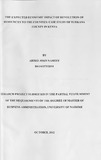| dc.description.abstract | At independence in 1963 the Majimbo Constitution Kenya adopted provided for devolution of
government to regional assemblies in the context of a bicameral, Westminster-type parliament with a Senate and National Assembly - the Lower and Upper Houses, respectively. These
constitutional provisions were premised on the need to secure the rights of ethnic minorities
grouped in the Kenya African Democratic Union (KADU) party, against domination by the 'big tribes' grouped in the Kenya African National Union (KANU) party. Kenya's new Constitution establishes forty seven new county governments, each with an elected Assembly, a Governor and an Executive Committee.
Both the Executive Committee and the Governor are from outside the Assembly, meaning that there will be full separation between the legislature and executive at county level, just as there is at national level. The researcher sought to determine the expected impact of devolution of resources on the economic development of the Turkana County. The specific objectives of the study were to evaluate the potential role and capacity of the proposed county governments to enhance economic development in the county and also to ascertain financial management capabilities by the administrators of the devolved funds.
The researcher used a case study as research design where the target population was members of Turkana County with an estimate of 1 M. The targeted population was 72 respondents where 12 people in every six districts. The researcher used systematic random sampling method of business leaders, government officials and opinion leaders in the district. Data was collected using questionnaires that were both open ended and closed ended and were admitted through drop and pick method. It was then analyzed using descriptive statistics and content analysis with the help SPSS data analysis tool. The final results was then presented inform of tables and charts for easy understanding and interpretation.
The researcher found that the people of Turkana were undecided on whether the previous devolution is better than the proposed one. However, the study found out that the Turkana people wanted locals to be given mandate to manage their own affairs since they belief they have leaders with adequate qualification and experience to manage their own resources. Finally, the researcher concludes by recommending that the government should engage the locals in preparation of devolution bills and in the management of the affairs of the county government. | en_US |

